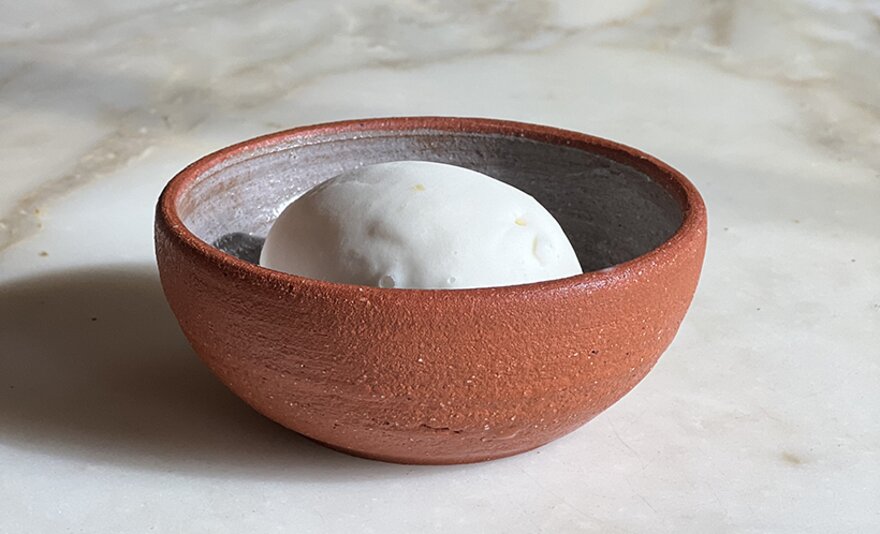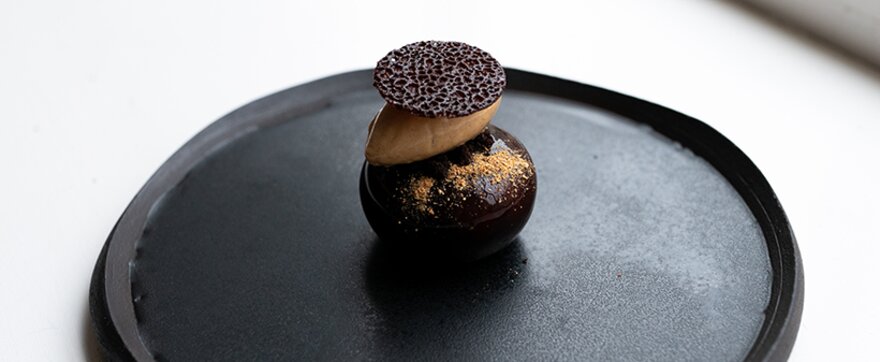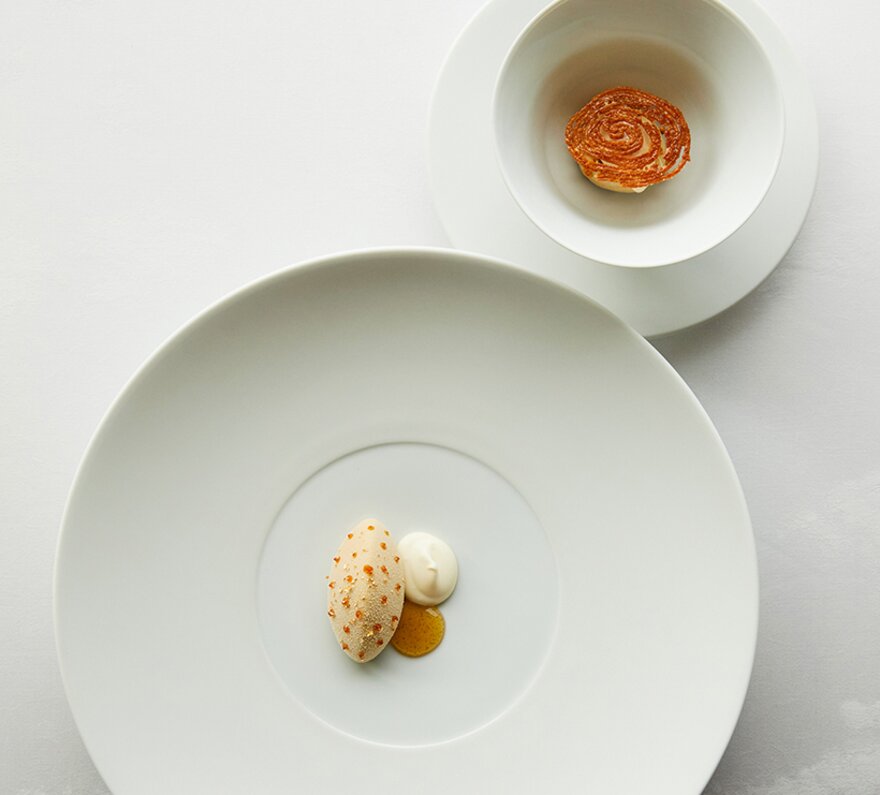From mushroom desserts through to petit fours made from greens, the UK's best chefs are blurring the lines between sweet and savoury. Rosie Conroy reports
Think of dessert and vanilla-laced ice-creams and rich chocolate tarts might come to mind, but across the UK's most inventive menus, puddings are becoming altogether less predictable. In a move away from tried-and-tested flavour pairings, chefs are finding ways to incorporate traditionally savoury ingredients in the final courses of their meals.
As with most things, the trend is cyclical and what feels like a contemporary shift actually has its roots buried much further back in our collective history. Some 500 years ago, in fact. Dr Eleanor Barnett – author of Leftovers: A History of Food Waste and Preservation – points out that cheese courses have been employed to finish meals for centuries. She says: "In Tudor times fancy feasts would have been closed with cheese because they thought that it literally sealed the stomach, which might otherwise emit nasty fumes as it ‘cooked' the rest of its contents. The stomach was thought of like a pot with a heat source below."
We've – thankfully – dispelled the myth of stomach cookers, but Fadi Kattan, chef patron of Palestinian restaurant Akub in Notting Hill, London, echoes the sentiment. He says that while savoury desserts have been in the minority in the UK up until now, the basic concept is nothing new: "They have been there for years in certain cultures," he says. "In Palestine our traditional dessert is knafeh, which is a salty Nabulsi cheese made with a spun semolina or flour crust, and soaked in a sweet syrup."
Opposites attract
This confluence of diametrically opposed elements, rather than a standard cheese course, has sparked the imagination of many chefs in the past few years, resulting in blurred lines between traditional main courses and puddings. Tom Heywood, chef proprietor of Pignut in Helmsley, York, considers savoury desserts a useful building block in the flow of a tasting menu.
He says: "In some ways I think savoury desserts have become more of a trend because in tasting menus they offer a balance; a cross-over course that's not too sweet and not too savoury. It just moves the menu on nicely to your final dessert."
His Moorside mushroom mousse dessert is made from dried oysters and lion's mane mushrooms and is finished with a coffee mirror glaze, coffee crumb, mushroom ice-cream and a coffee tuile. Rather than a deep, earthy flavour, Heywood notes the mushrooms bring a malty note to the dish, so the finished product sits in that middle ground of neither sweet nor savoury.
Glasgow-based chef-owner of Fallachan, Craig Grozier – who admits he doesn't like super-sweet desserts – credits the Scandinavian countries with inspiring the recent upturn in savoury desserts. He says: "I reckon the trend has grown from the popularity of Scandinavian cooking and has filtered into the UK and beyond from there."
Elsewhere in Edinburgh, Cardinal's head of pastry Mia Frizzi references Coda's influence in Berlin. This two-Michelin-starred spot creates every plate using pâtisserie principles, across 15 sweet and savoury courses, which it labels ‘dessert dining'.
In the UK some nod to Yorkshire-born Tommy Banks' role in popularising savoury desserts. In the early days of his family-run, Michelin-starred restaurant the Black Swan in Oldstead in York, the chef introduced a potato and chicory dessert that immediately generated a buzz. While it might not be on the menu any more, Banks still mixes sweet and savoury flavours at the end of his tasting menu, employing ingredients such as mushrooms and artichokes to add a satisfying umami twang to the final few bites of the guest experience.
In London, Trivet – which was awarded two Michelin stars in the The Michelin Guide Great Britain & Ireland 2024 – has a signature spud serve. Its ‘Hokkaido potato' takes a baked potato mille-feuille and pairs it with a sake and white chocolate mousse, butter and sake gelato.
At newly opened Brooklands in the Peninsula hotel in Belgravia, London (also awarded two Michelin stars in the 2024 guide), French chef Claude Bosi's menu includes a Scottish cep and banana dessert. He says: "I wanted to create a dessert inspired by the classic combination of bananas and caramel, and decided to add a savoury element in the form of Scottish cep to bring a greater level of depth to the dish."
Another vegetable-led offering comes from Grozier, whose Jerusalem artichoke dessert uses winter's seasonal produce. Its chef says: "Using Jerusalem artichoke makes sense to me as it has nutty, sweet notes and there is actually a lot of sugar in a Jerusalem artichoke. When the juice is reduced down to a syrup it intensifies the natural sugars in the vegetable, leaving you with caramel and burnt orange notes, which naturally pair well with chocolate."
An additional driving force behind the movement has been the heightened awareness of seasonality across the board, note both Frizzi and Crozier. The summer fruit season in the UK can be short and unpredictable, so in order to stick to self-imposed sustainability principles, many chefs have had to adapt and look for alternative ingredients.
Animal instinct
Aside from fruit and vegetables, many spots are also employing the use of another surprising ingredient: animal fat. At Lisboeta in London there's the now Insta-famous egg yolk and pork fat custard with port wine caramel, and at Fallow's new sibling site Fowl, chefs Jack Croft and William Murray served a chicken fat crème caramel before introducing this season's chicken fat tarte tatin. Part of the appeal, of course, is the ‘Willy Wonka effect', surprising and delighting guests with something unexpected. It's how Heston Blumenthal became one of Britain's biggest names back in the 1990s when he introduced his shapeshifting courses.
The guest experience will always dictate the success of a certain sub-genre of food, and the speed at which savoury desserts are gathering momentum seems to indicate their popularity with punters as well as chefs. Speaking about his za'atar ice-cream at Akub, Kattan, says he receives consistently enthusiastic responses from diners, noting: "Usually people are surprised to find za'atar in ice-cream, but then they find out how delicious it is. A lot of them come back for it again."
While savoury desserts might never fully replace the sweet classics, the appetite for them is evidently growing. With chefs relinquishing the rules and coming up with increasingly clever ways to use unusual ingredients, this take on desserts is proving to be a trend with endlessly exciting possibilities to savour.
Some of the best savoury desserts in the UK
- Za'atar ice-cream, Akub, London
- Scottish cep, banana and crème fraîche, Brooklands by Claude Bosi, London
- Chicken fat tarte tatin, Fowl, London
- Hokkaido potato mille feuille, Trivet, London
- Pork fat custard with a port caramel, Lisboeta, London
- Beremeal shortbread with an Irish sea vegetable glaze, Cardinal, Edinburgh
- Birch puffed barley and Jerusalem artichokes, Fallachan, Glasgow
- Moorside mushroom mousse, Pignut, York
- Yogurt sorbet with birch sap syrup and spruce tips, the Black Swan at Oldstead, York
Claude Bosi on his most memorable savoury desserts
"I had a [savoury dessert] a few years ago at a small restaurant in Lyon. The mushroom custard tasted liked caramel, and brought a rich, savoury element to the dessert when paired with the silkiness of the custard.
"Another one that always comes to mind is a black pudding and hazelnut dessert I had while on holiday in Rome, and I also love the pork fat custard with port caramel at Lisboeta."
Top image: Stephen Lister. Fallachan: Michael C Hunter
Continue reading
You need to be a premium member to view this. Subscribe from just 99p per week.
Already subscribed? Log In












